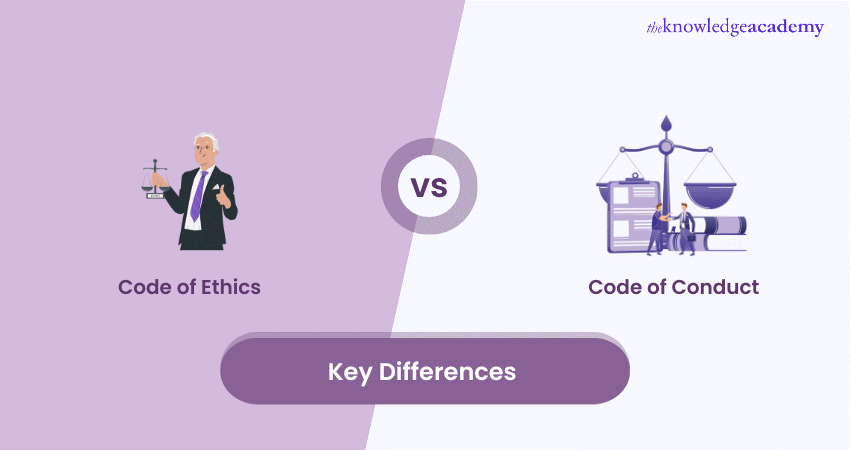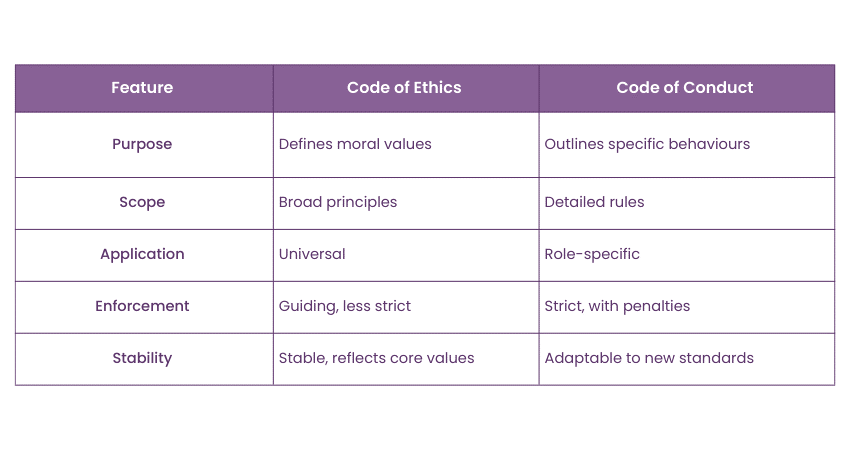We may not have the course you’re looking for. If you enquire or give us a call on +971 8000311193 and speak to our training experts, we may still be able to help with your training requirements.
Training Outcomes Within Your Budget!
We ensure quality, budget-alignment, and timely delivery by our expert instructors.

In organisational governance, the Code of Ethics and Code of Conduct concepts serve as fundamental frameworks, guiding individual and collective behaviour. While they share the common goal of establishing a baseline for integrity and professionalism, there are significant differences between the two.
A Code of Ethics involves delineating the values and principles that influence moral decisions within an organisation. Conversely, a Code of Conduct involves providing specific guidelines on the behaviours and actions expected from employees. Interested to learn more about them? Read this blog further to understand the difference between Code of Ethics and Code of Conduct and foster an ethical workplace culture.
Table of Contents
1) What is the Code of Ethics?
2) What is the Code of Conduct?
3) Code of Conduct vs Code of Ethics: What’s the difference?
a) Purpose and scope
b) Application
c) Enforcement and compliance
d) Creation and evolution
4) Conclusion
What is the Code of Ethics?
A Code of Ethics is a formal document that outlines the moral principles and ethical standards expected to guide organisational behaviour. It serves as a crucial element for ethical decision-making, providing a framework that helps individuals navigate ethical dilemmas and fostering a culture of integrity and accountability. This set of principles emphasises the organisation's commitment to fairness, transparency, and responsibility.
The Code of Ethics is not just a set of rules but a declaration of the organisation’s values and commitment to ethical practices. It aims to positively influence the overall ethos and culture of the organisation.
It applies to all levels of the organisation, from executives to employees, ensuring that every decision and action aligns with the broader ethical standards established by the organisation. By adhering to a Code of Ethics, organisations strive to maintain trust and respect among their stakeholders, mitigate risks associated with unethical behaviour, and enhance their reputation in the marketplace.
What is the Code of Conduct?
A Code of Conduct is a practical guide designed to implement the ethical standards outlined in Code of Ethics into specific behaviours and actions required from the organisation's members. It translates broad ethical principles into concrete terms, detailing the dos and don'ts of professional conduct. This document often covers compliance with laws, workplace behaviour, discrimination and harassment, confidentiality, and conflicts of interest.
The Code of Conduct is a good reference point for employees, offering clear instructions on acting in various professional scenarios. Setting clear expectations helps prevent misconduct, fostering a respectful, safe, and professional work environment.
Organisations enforce the Code of Conduct through policies and procedures, which may include disciplinary actions for violations. This ensures that all organisational activities are performed ethically and legally, reinforcing the organisation's commitment to integrity.
Do you want to learn about organisational benefits? Then register now for our CMI Level 5 Award in Professional Mentoring Practice Training!
Code of Conduct vs Code of Ethics: What’s the difference?
The key differences between a Code of Ethics and a Code of Conduct lie in their scope, purpose, and application within an organisation. Here's a detailed exploration of their differences:

Purpose and scope
A Code of Ethics is broad, outlining the values and moral principles that guide an organisation's overall behaviour and decision-making. It's philosophical and abstract, focusing on general principles such as integrity, honesty, and fairness.
In contrast, a Code of Conduct is more specific and action-oriented, providing clear, concrete guidelines about acceptable and unacceptable workplace behaviour. It addresses particular scenarios and outlines procedures and consequences related to violations.
Application
The Code of Ethics applies universally to everyone within an organisation, serving as a moral compass and fostering a culture of ethical decision-making. Meanwhile, the Code of Conduct often includes specific rules for roles or situations, offering detailed instructions on compliance, interactions, and procedures.
Do you want to be a certified mentor? Then register now for our CMI Level 5 Diploma in Management Coaching and Mentoring Training!
Enforcement and compliance
While both are enforceable, the Code of Conduct is typically accompanied by explicit consequences for non-compliance, ranging from warnings to dismissal. It's closely tied to regulatory and legal standards. The Code of Ethics, on the other hand, though enforceable, serves more as a guide for ethical decision-making rather than a rulebook with prescribed penalties.
Creation and evolution
A Code of Ethics is generally more stable, reflecting the enduring values of an organisation. It changes infrequently, mainly when there's a significant shift in the organisation's mission or values. On the contrary, the Code of Conduct may evolve more regularly, adapting to new laws, industry standards, or organisational policies.
Conclusion
A Code of Ethics and Code of Conduct are essential for promoting integrity and accountability in organisational practices. They complement each other, with the Code of Ethics providing the moral foundation upon which the Code of Conduct builds specific behavioural guidelines. Together, they help organisations navigate ethical dilemmas, maintain legal compliance, and ensure a positive and respectful workplace culture.
Gain advanced leadership and organisational skills with our CMI Level 5 Training - join now!
Frequently Asked Questions

A Code of Ethics outlines an organisation's moral principles and values, guiding overall behaviour and decision-making. In contrast, a Code of Conduct provides specific, actionable guidelines and standards expected of employees' behaviour, detailing the dos and don'ts in professional contexts.

An example of a Code of Conduct is a company's policy that requires employees to act professionally, respect confidentiality, and avoid conflicts of interest. A Code of Ethics example might be a commitment to fairness, honesty, and integrity in all business dealings and relationships.

The Knowledge Academy takes global learning to new heights, offering over 30,000 online courses across 490+ locations in 220 countries. This expansive reach ensures accessibility and convenience for learners worldwide.
Alongside our diverse Online Course Catalogue, encompassing 17 major categories, we go the extra mile by providing a plethora of free educational Online Resources like News updates, Blogs, videos, webinars, and interview questions. Tailoring learning experiences further, professionals can maximise value with customisable Course Bundles of TKA.

The Knowledge Academy’s Knowledge Pass, a prepaid voucher, adds another layer of flexibility, allowing course bookings over a 12-month period. Join us on a journey where education knows no bounds.

The Knowledge Academy offers various CMI Level 5 Training, including CMI Level 5 Award In Management and Leadership Training, CMI Level 5 Award in Management and Leadership Training, and CMI Level 5 Diploma in Management and Leadership Training. These courses cater to different skill levels, providing comprehensive insights into ILM Level 5 methodologies.
Our ILM, CMI Leadership & Management blogs covers a range of topics related to CMI, offering valuable resources, best practices, and industry insights. Whether you are a beginner or looking to advance your organisational skills, The Knowledge Academy's diverse courses and informative blogs have you covered.
Upcoming ILM, CMI Leadership & Management Resources Batches & Dates
Date
 CMI Level 5 Award in Management and Leadership Training
CMI Level 5 Award in Management and Leadership Training
Fri 28th Feb 2025
Fri 4th Apr 2025
Fri 27th Jun 2025
Fri 29th Aug 2025
Fri 24th Oct 2025
Fri 5th Dec 2025







 Top Rated Course
Top Rated Course



 If you wish to make any changes to your course, please
If you wish to make any changes to your course, please


